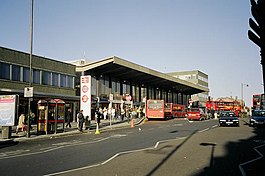
Back باركينغ (محطة مترو أنفاق لندن) Arabic Estació de Barking Catalan Barking (stanice metra v Londýně) Czech Bahnhof Barking German ایستگاه بارکینگ Persian Barkingin metroasema Finnish Barking (métro de Londres) French 百慶站 GAN Barking állomás Hungarian Stazione di Barking Italian
| Barking | |
|---|---|
 The station forecourt in 2004 | |
| Location | Barking |
| Local authority | London Borough of Barking and Dagenham |
| Managed by | c2c |
| Owner | Network Rail |
| Station code(s) | BKG |
| DfT category | B |
| Number of platforms | 9 (facing 8 tracks) |
| Accessible | Yes[1][2] |
| Fare zone | 4 |
| London Underground annual entry and exit | |
| 2019 | |
| 2020 | |
| 2021 | |
| 2022 | |
| 2023 | |
| National Rail annual entry and exit | |
| 2019–20 | |
| – interchange | |
| 2020–21 | |
| – interchange | |
| 2021–22 | |
| – interchange | |
| 2022–23 | |
| – interchange | |
| 2023–24 | |
| – interchange | |
| Railway companies | |
| Original company | London, Tilbury and Southend Railway |
| Pre-grouping | Midland Railway |
| Post-grouping | London, Midland and Scottish Railway |
| Key dates | |
| 13 April 1854 | Opened by LT&SR |
| 1902 | District line started |
| 1905 | District withdrawn |
| 1908 | District line restarted |
| Listed status | |
| Listed feature | Booking hall |
| Listing grade | II |
| Entry number | 1242678[9] |
| Added to list | 24 November 1995 |
| Other information | |
| External links | |
| Coordinates | 51°32′21″N 0°04′54″E / 51.5393°N 0.0817°E |
Barking is an interchange station serving the town of Barking, east London. It is served by London Underground, London Overground and National Rail main line services. It is located on Station Parade, in the town centre.
On the Underground it is a stop on the District line and is also the eastern terminus of the Hammersmith & City line; on the National Rail network it is served by c2c services operating to and from Fenchurch Street; and on the Overground it is on Suffragette line to Barking Riverside and Gospel Oak. There is also interchange with London Buses and East London Transit routes on the station frontage. The Underground station is the busiest in the network outside of Zones 1 and 2.
The station was opened in 1854 by the London, Tilbury and Southend Railway as one of the first stations on the route. It was rebuilt in 1908 and again in 1959. As of June 2023[update], significant redevelopment of the station is ongoing.
- ^ "Step free Tube Guide" (PDF). Transport for London. April 2021. Archived (PDF) from the original on 15 May 2021.
- ^ "London and South East" (PDF). National Rail. September 2006. Archived from the original (PDF) on 6 March 2009.
- ^ "Station Usage Data" (XLSX). Usage Statistics for London Stations, 2019. Transport for London. 23 September 2020. Archived from the original on 9 November 2020. Retrieved 9 November 2020.
- ^ "Station Usage Data" (XLSX). Usage Statistics for London Stations, 2020. Transport for London. 16 April 2021. Retrieved 1 January 2022.
- ^ "Station Usage Data" (XLSX). Usage Statistics for London Stations, 2021. Transport for London. 12 July 2022. Retrieved 7 September 2022.
- ^ "Station Usage Data" (XLSX). Usage Statistics for London Stations, 2022. Transport for London. 4 October 2023. Retrieved 10 October 2023.
- ^ "Station Usage Data" (XLSX). Usage Statistics for London Stations, 2023. Transport for London. 8 August 2024. Retrieved 16 September 2024.
- ^ a b c d e f g h i j "Estimates of station usage". Rail statistics. Office of Rail Regulation. Please note: Some methodology may vary year on year.
- ^ Cite error: The named reference
NHLE1242678was invoked but never defined (see the help page).
